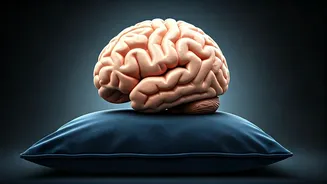Memory's Secret Ingredient
The process of forming and retrieving memories is remarkably intricate, relying heavily on the brain's ability to consolidate information. Rest, it turns
out, is a pivotal component in this process. When we allow our minds to wander or simply relax, the brain's default mode network (DMN) becomes active. This network, which includes regions like the medial prefrontal cortex and the posterior cingulate cortex, is crucial for consolidating memories. During rest, the brain replays and reinforces recently acquired information, strengthening the neural connections that form memories. This is why periods of relaxation, whether they are brief or extended, are so critical for enhancing cognitive function and retaining new information. The DMN’s activity during rest helps to transfer information from short-term to long-term memory, making recall easier and more efficient.
Boosting Memory Instantly
Surprisingly, boosting your memory might be as simple as taking a two-minute break. This can be achieved by consciously shifting your focus away from demanding tasks and allowing your mind to briefly disconnect. During this time, consider practices such as deep breathing, meditation, or simply gazing at a calming scene. These actions encourage relaxation and reduce mental clutter. By allowing the brain to enter a state of reduced activity, you give it the opportunity to consolidate memories more effectively. This technique is especially useful when trying to learn new material or recall information that feels difficult to access. The goal is to create an environment where the brain can efficiently process and store the information, thereby enhancing memory function. It is important to note, consistency is key, and incorporating these micro-rests into your daily routine can yield noticeable improvements in memory and overall cognitive performance.
Beyond Sleep's Embrace
While sleep is often hailed as the ultimate memory booster, rest offers a distinct yet equally important advantage. The memory consolidation that occurs during sleep, crucial as it is, primarily involves the processing and storage of information gathered during the day. However, rest provides a more immediate and accessible form of cognitive refreshment. Short breaks allow the brain to actively consolidate new memories and improve recall in real-time. Moreover, the benefits of rest are accessible at any time of day, unlike the more structured and lengthy duration of sleep. Incorporating short breaks into your day can significantly improve your mental clarity and memory function, regardless of the amount of sleep you're getting. Consider rest as a supplemental tool that complements, rather than competes with, the benefits of quality sleep. This dual approach offers the most comprehensive way to optimize memory and cognitive function.
The Power of Micro-Rests
Micro-rests are short, deliberate periods of rest that can be easily integrated into a busy schedule. These brief intervals, which could last from a few seconds to a couple of minutes, are designed to give your brain a mini-vacation from the intensity of constant activity. During these breaks, you can engage in activities that promote relaxation, such as closing your eyes, practicing deep breathing exercises, or focusing on a calming visual like a scenic landscape or a peaceful object. The purpose is to reduce mental fatigue and allow the brain to recharge. These mini-breaks are especially helpful during periods of intense cognitive activity, like studying or working on a complex project. By consciously allowing yourself these short periods of rest, you can improve your attention span, enhance your memory function, and reduce stress levels. This practice is a practical and effective way to maintain peak mental performance throughout the day.
Rest vs. Sleep
Rest and sleep, while both vital for cognitive health, are distinct processes. Sleep is a longer, more passive state characterized by physical inactivity and specific brain wave patterns. It is essential for long-term memory consolidation, allowing the brain to organize and store information acquired throughout the day. Rest, on the other hand, is a more active process involving conscious relaxation and a brief pause from mental exertion. While sleep is crucial for overall brain health, rest can be used strategically throughout the day to improve focus, enhance memory recall, and reduce mental fatigue. Recognizing the differences between these states enables individuals to strategically incorporate both into their daily routines. Use rest to address immediate mental fatigue and focus, while relying on sleep for deeper cognitive repair and consolidation.













